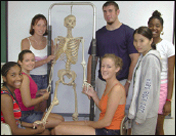Reducing Ethnic Disparities in Health Care
- Margaret I Aguwa
- College of Osteopathic Medicine

Twelfth graders in the OsteoCHAMPS program. Three members of the initial cohort (2001-2002) have since matriculated at MSU's College of Osteopathic Medicine.
Researcher. Clinician. Mentor. Administrator. Volunteer. Margaret Aguwa, Associate Dean for Community Outreach and Clinical Research, College of Osteopathic Medicine, has worked tirelessly to involve members of ethnic minority and disadvantaged groups in the medical professions and in advancing their own health care.
Dr. Aguwa's research interests range from women's health, to African health, to osteopathic medical education. A breast cancer survivor herself, Aguwa founded a breast cancer survivors' support group and was one of the first to devote programs to African-American and Latina cancer patients. She directed and produced a medical video on breast self-examination for minority women, with minority women as models. This work won her a Merit Award in 1992 from the Michigan Division, American Cancer Society.
Aguwa developed, founded, and directs OsteoCHAMPS (Careers in Health and Medical Professions), an innovative research and outreach "pipeline" program that promotes health careers to disadvantaged high school students in Michigan. The highlight of the initiative is its summer Pre-college Residential Enrichment Program (PREP). For two weeks in July, high school juniors and seniors visit the MSU campus for courses, workshops, and research with medical professionals. The students also learn methods to enhance their study, motivation, leadership, and basic science skills. The program is primarily financed by osteopathic hospital foundations.
OsteoCHAMPS has grown from a small group of 11th grade students from Detroit in 2002 to about 25 participants annually from six Michigan communities. "We have been amazed at the preparedness of these young students, their level of research, and some of the recommendations they have proposed," said Aguwa. She pointed out that "OsteoCHAMPS doesn't just bring diversity to the profession, it also benefits patients by encouraging students who become osteopathic physicians to provide medical care in underserved communities."
OsteoCHAMPS' many partners include schools, hospital foundations, and MSU Extension, among others. "Extension agents scout out kids for us," said Aguwa. "There's a guy in Muskegon, Frank Cox, who is just wonderful. He meets with the kids every two months. They do job shadowing with physicians. If students get admitted to OsteoCHAMPS, he helps them find scholarships. His dedication really shows results."
Cox prefers to give the credit to Aguwa: "Dr. Aguwa has opened a door for positive youth development through higher education," he said. "As a 4-H educator I greatly appreciate her vision to promote the health sciences for minority and disadvantaged high school students in Michigan, especially here in Muskegon County. OsteoCHAMPS has been a great benefit for the student participants in Muskegon. Because of Dr. Aguwa, we have an awesome opportunity to help educate high school students on their career passion for the health sciences."
Aguwa's research work also combines her twin themes—training medical students in cultural sensitivity and patient lifestyle issues, and improving health care for the disadvantaged. With funding from Michigan Department of Community Health, she has developed a program that will better prepare MSU osteopathic medicine students to understand and serve Medicaid patients with diabetes. The students receive intensive training on both diabetes education and interacting effectively with Medicaid patients. Aguwa said, "We want our students to understand the societal importance of working with Medicaid patients. They need to use language that is easily understood by lay persons, deliver culturally appropriate care, and see that their patients' access and transportation issues are addressed." The program evaluation is ongoing, and uses student feedback in making alterations and improvements.
- Written by Cathy Gibson, University Outreach and Engagement